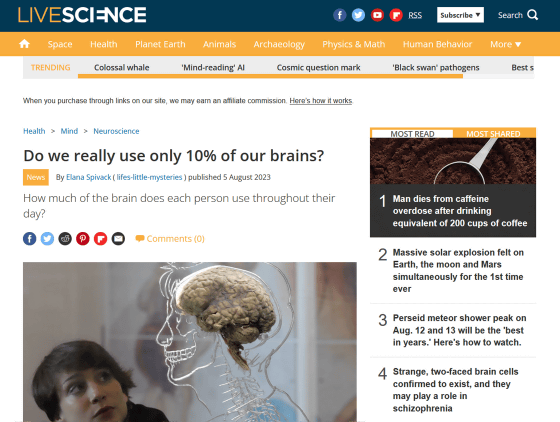Is it true that humans only use 10% of their brains?

The discourse that ``normal humans use only 10% of their brains'' has been used for a long time, and some people believe that humans can release the power of the hidden brain in case of emergency. Scientific media Live Science summarizes what modern neuroscientists think about this discourse.
Do we really use only 10% of our brains? | Live Science

The discourse that ``humans use only 10% of their brains'' became known to the world in the preface to Dale Carnegie 's self-help book ` ` Moving People '' published in 1936. -Thomas wrote, ``Professor William James of Harvard University once said that the average human being can only develop 10% of their potential mental abilities.'' This sentence eventually changed to the content that 'humans use only 10% of the brain' and spread, but it is not clear whether James, who is actually said to be the 'father of psychology', spoke like this.
``We use all of our brains all the time,'' said Ellen Hecht , assistant professor of evolutionary neuroscience at Harvard University, and argues that this discourse is false. Mr. Hecht says that when a student brings up this story during his class, ``If someone uses only 10% of their brain, they are probably connected to a ventilator,'' he said.
Mr. Hecht argues that the brain is always active even when we are asleep, just like the heart pumps blood even when we are resting. 'Neurons need to fire at some sort of baseline level to keep themselves healthy,' he said. Also, although the brain processes different areas for each area, the entire brain is interconnected as a network, and no single area operates in isolation. Therefore, it seems that there is no state that 'only part of the brain is used and the rest is resting without any activity'.
``This is a very interesting myth,'' said Julie Fratantoni, a cognitive neuroscientist at the University of Texas at Dallas, pointing out that he doesn't really understand the definition of ``10% of the brain'' in the first place. He argued that he did not know whether it was 10% of brain volume, 10% of energy metabolism, or 10% of electrical activity and blood oxygen concentration.

The amount of energy your brain uses tends to be less for skills you already know well. When humans practice a particular skill, the brain area associated with that skill physically expands, processing the skill more efficiently and requiring less energy. Researchers believe that the expansion of brain regions may be due to more neuronal connections and increased angiogenesis . ``The brain becomes less active as you become more proficient in the skill you are learning,'' Hecht said.
Hecht points out that in people who have suffered a stroke or brain-damaging injury, another brain region can take over the processing that the damaged area was responsible for. Mr. Hecht argued that the brain is a very flexible organization, and it is difficult to find the range of '10% of the brain' in the first place.

Related Posts:
in Science, Posted by log1h_ik







